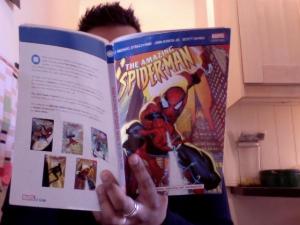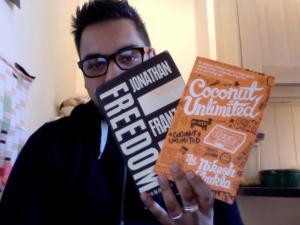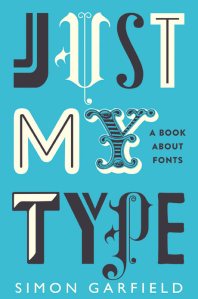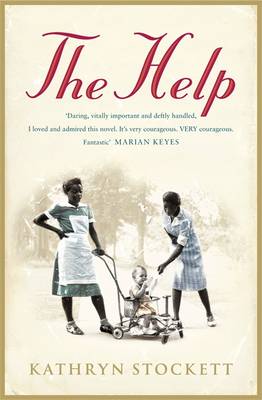In my London literary scene adventures this past year, I’ve had the chance to hear lots of authors read. Some are amazing writers, but read so quietly and nervously that I’m embarrassed for them and can’t even listen to what they’re reading, because I’m just going “la la la!” in my head to block out the cringe. Some have no problems in the confidence department but hold listeners hostage for 30-some-odd minutes over their allotted time. And some are very entertaining. Nikesh falls into that entertaining category (thank goodness, or this intro would be SUPER awkward). If you ever get a chance to listen to him read about samosa-tinged first kisses and raps that are only “pretty” cool, I highly recommend it.
Nikesh’s first book, Coconut Unlimited, just came out this week. This is a BFD. How does someone even write a book, anyway? Nikesh? (Hint: It definitely involves tasty and healthy Waitrose breakfast foods.)
Jonathan Franzen sat in a minimalist room with his internet connection unplugged, no things to distract him, with the soothing sounds of pink noise humming in the background for nine years writing Freedom, its every brilliant yet overlong sentence poured over and dissected and reconstituted with the precision of a chess grand wizard, only emerging for a diet of raw protein and carbohydrate. His writing process sounds more like Olympic bodybuilding training.
I, on the other hand, wrote a book in my kitchen, surrounded by the smell of whatever whimsical culinary experiment my wife embarked upon, a stack of Spiderman comics I was too busy to read and the internet streaming through annals of hip hop history I needed to know before writing, not that any of it made the final cut, while Spotify streamed loops of endless mid-90s boom-bap ranging from barbershop quartet remixes of The Pharcyde’s ‘Ya Mama’ to Fu-Schnicken’s tongue-twisting cover version of Tenor Saw’s ‘Ring The Alarm’.

I thrive on chaos, it would seem.
Jonathan Franzen has Freedom to show for his disciplined efforts. I have a silly comedic book about bad rappers called Coconut Unlimited.

Writing the book usually means starting early- around 6am. I’m less likely to be distracted by Gchats from my frowsy crew, Mr Lingo, Vee Kay, NDogg or Bone before office hours when they’re sat at their desks, looking for the first thing to distract them from working. I stare at the picture of Spiderman my nephew Will drew for me and get on with it. You see, we were on a family holiday at the British seaside. Will was having one of those days when he was only slightly too old to be cheeky with the older boys so they taunted him back. Upset, he came and sat next to me and drew me a picture of Spiderman, the meaning clear – if only he’d been around, he’d have protected me from those older boys. Inspiration from that picture done, I do a recap – where did I get to last night and where am I going now? I only have to get 1000 words down before I can log on to Twitter and call Gavin James Bower a toilet.

Write.
No wait, it’s breakfast time – and I’m not a savage, it is the first most important meal of the day. So, I pour out the three drinks of kings – water, juice and coffee and hydrate, vitaminise and caffeinate for the next few hours. Porridge is consumed, because hey, it’s not like I’m on a major label advance or anything and yes, I live in Crouch End, so yes the porridge is Waitrose own but I still got love for the streets.

Breakfast finished and various household errands finished and it’s time for Frasier on breakfast television and I know I’ve seen each episode before but I’m writing a comedy book and this is like a masterclass, am I right? Hello? Is this thing on? The laptop’s next to me in case inspiration overtakes, but I’ve decamped to the sofa. An hour later and I’m ready to write, but I feel like I should at least shower right? That’s what the Crane boys would do. I’m not a savage after all.
Showered shaved and at my desk and I mean it now. But look, it’s 9am. Mr Lingo or Bone’ll be in the office by now. I send an email round-robin round to see what everyone’s been up to over the last 12 hours. Chances are I’ve seen at least one of them in the last 12 hours. Noticing other emails that need attending to, I answer them, do some life admin, some book admin, and more importantly some social admin. I call Gavin James Bower a toilet on twitter and I get to it. Right, 1000 words before midday. That’s nearly only an hour away.
(At this point, I wonder whether Franzen’s discipline would produce better results.)
But then, amazingly, it all swings into gear. I may have taken an age to get myself focussed, I should have just had another hour in bed. It all flows from here. The beauty, I remember, of writing an energetic book of back-and-forth banter and silly posturing is that writing it is a pleasure. No sentence is too painful to work through. The dialogue sparkles with energy and verve. I can hear all the voices in my head, feel their faces red with embarrassment under the melanin. The first draft is just brilliantly overindulgent. I find myself laughing endlessly at the phrase ‘jokey or sexy’. Before I know it, it’s 2pm and my stomach is rumbling, I’ve missed my lunch spot and I don’t quite want to stop. Here’s where a handily-stashed bag of crisps in my bag helps. I plough through them and carry on writing. By 3pm, it’s back to Twitter to try and make people laugh, glowing in the solitary bonhomie of a good session. By 5pm, when my wife comes home, I’m awkward and animated, having not spoken to anyone since 7am.
There are usually bad days too. These involve a lot more Twitter and Gchat and email.
I’d say today, though, was a good day. I didn’t even have to use my AK.
Yes, verily, I’d say today was a good day. http://www.youtube.com/watch?v=h4UqMyldS7Q&ob=av3e






















